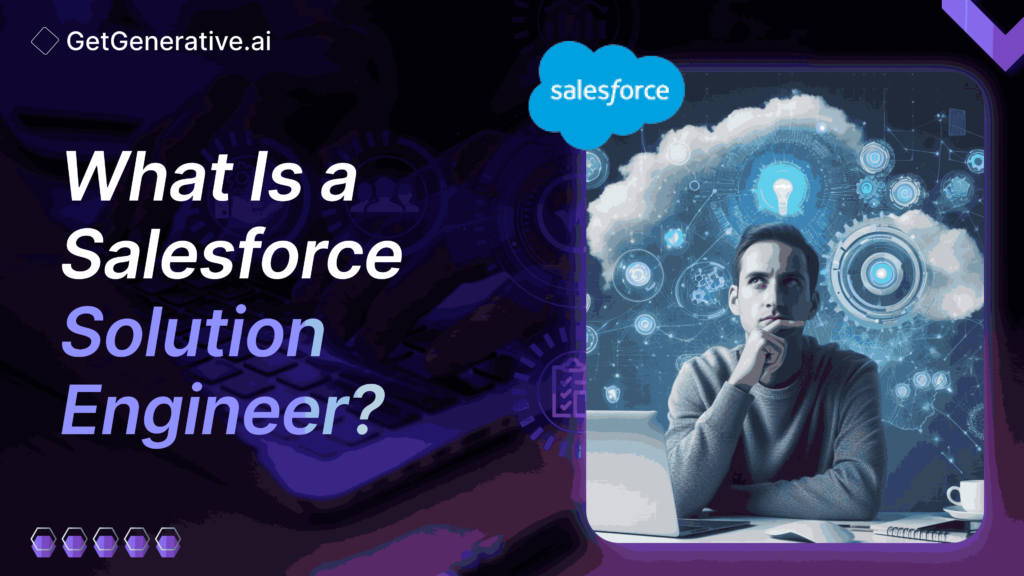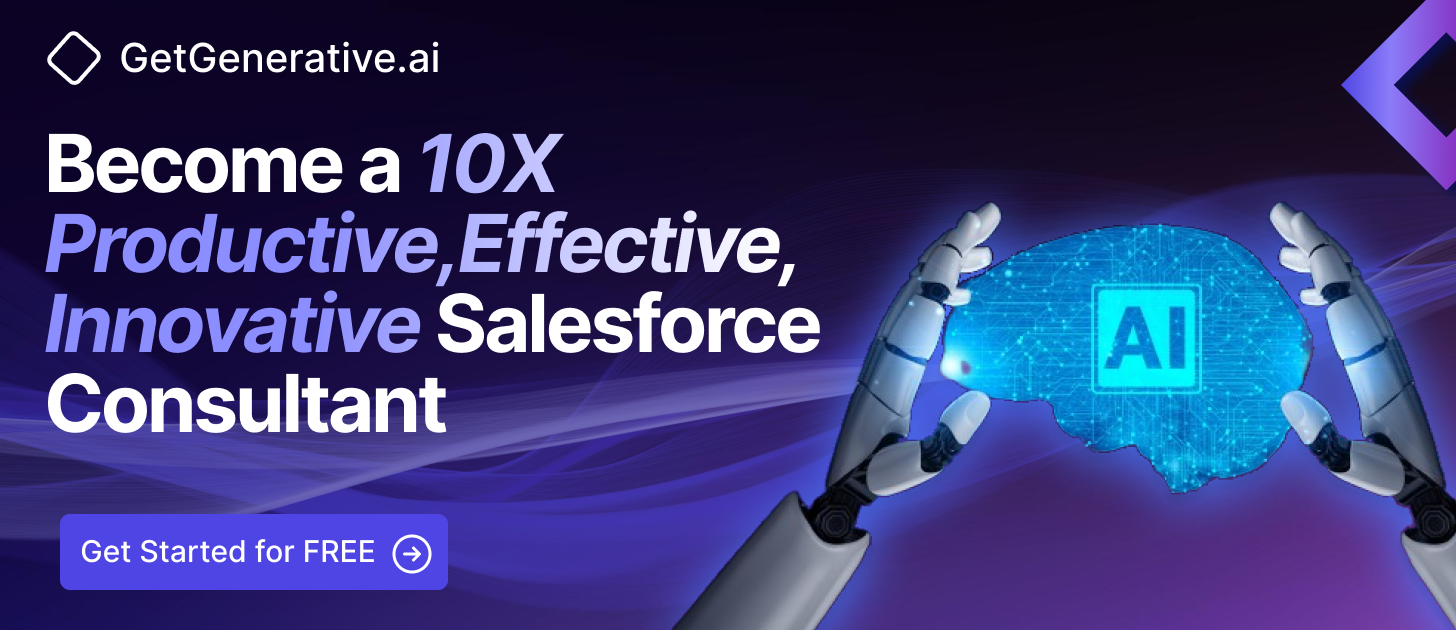What Is a Salesforce Solution Engineer?
Salesforce has emerged as a leader, with a market share of 21.8% in 2024. As organizations increasingly adopt Salesforce solutions, the demand for skilled professionals who can bridge the gap between technical capabilities and business needs has skyrocketed.
Salesforce Solution Engineer—a crucial role in the Salesforce ecosystem that combines technical expertise with business acumen to deliver tailored solutions for clients.
What does a Salesforce Solution Engineer do?
A Salesforce Solution Engineer is a technical expert who works closely with sales teams and customers to design, demonstrate, and implement Salesforce solutions. Their primary responsibilities include:
- Understanding customer requirements and business processes
- Designing custom Salesforce solutions to meet specific needs
- Creating and delivering product demonstrations
- Providing technical expertise during the sales process
- Collaborating with implementation teams to ensure successful project delivery
How do Salesforce Solution Engineers contribute to customer satisfaction?
Salesforce Solution Engineers play a pivotal role in ensuring customer satisfaction by:
- Translating complex technical concepts into business value
- Tailoring solutions to address specific pain points and challenges
- Providing expert guidance throughout the sales and implementation process
- Ensuring that the proposed solutions align with the customer’s long-term goals
- Offering innovative ideas to maximize the value of Salesforce investments
Required skills for a Salesforce Solution Engineer
To excel in this dynamic and challenging role, a Salesforce Solution Engineer should possess diverse skills that blend technical expertise, business acumen, and interpersonal abilities. Here’s a detailed breakdown of the essential skills:
In-depth Salesforce Knowledge:
- Comprehensive understanding of Salesforce’s core products (Sales Cloud, Service Cloud, Marketing Cloud, etc.)
- Familiarity with Salesforce platform capabilities, including custom objects, workflows, and automation tools
- Knowledge of Salesforce’s latest features, releases, and roadmap
- Understanding of Salesforce security models and best practices
Also Read – The Ultimate Salesforce Sales Cloud Features Cheat Sheet
Technical Skills:
- Proficiency in Salesforce configuration and customization
- Basic to intermediate programming skills (Apex, Visualforce, Lightning Web Components)
- Understanding of database concepts and data modeling
- Knowledge of API integration techniques and middleware technologies
- Familiarity with web technologies (HTML, CSS, JavaScript)
- Knowledge of mobile application development principles
Business Process Analysis:
- Ability to quickly grasp and analyze complex business processes
- Skills in process mapping and optimization
- Understanding common business functions (sales, marketing, customer service, etc.)
- Capability to identify inefficiencies and propose Salesforce-based solutions
Communication Skills:
- Excellent verbal communication for presentations and client interactions
- Strong written communication for proposals and documentation
- Ability to explain complex technical concepts in simple, business-friendly terms
- Active listening skills to understand client needs and concerns
- Proficiency in creating and delivering compelling product demonstrations
Problem-Solving and Analytical Thinking:
- Ability to approach complex problems systematically
- Skills in root cause analysis
- Capacity to think creatively and develop innovative solutions
- Aptitude for data analysis and interpretation
Project Management:
- Understanding of project management methodologies (Agile, Waterfall)
- Ability to estimate project scope, timelines, and resources
- Skills in managing stakeholder expectations
- Capacity to prioritize tasks and manage time effectively
Industry Knowledge:
- Understanding of industry-specific business processes and challenges
- Awareness of industry trends and how they impact CRM needs
- Familiarity with common regulatory requirements (e.g., GDPR, HIPAA)
Sales Acumen:
- Understanding of the sales process and cycles
- Ability to identify and articulate value propositions
- Skills in objection handling and negotiation
- Capacity to build and maintain client relationships
Presentation and Public Speaking:
- Confidence in presenting to diverse audiences, from C-level executives to IT teams
- Ability to create engaging and informative presentation materials
- Skills in managing Q&A sessions and thinking on your feet
Continuous Learning:
- Self-motivation to stay updated with Salesforce’s evolving ecosystem
- Proactive approach to skill development and certification
- Curiosity about emerging technologies and their potential impact on CRM
Collaboration and Teamwork:
- Ability to work effectively with sales teams, implementation consultants, and developers
- Skills in mentoring and knowledge sharing
- Capacity to work in cross-functional teams
Adaptability and Flexibility:
- Ability to quickly adapt to changing client needs or project requirements
- Flexibility to work on multiple projects or clients simultaneously
- Openness to travel, as the role often requires on-site client visits
Emotional Intelligence:
- Empathy to understand and address client concerns
- Self-awareness and self-regulation in high-pressure situations
- Social skills to navigate complex client relationships
By cultivating these skills, a Salesforce Solution Engineer can effectively bridge the gap between technical possibilities and business needs, driving successful Salesforce implementations and fostering long-term client relationships.
Also Read – What Is a Salesforce Architect?
Differences between a Salesforce Solution Engineer and a Salesforce Developer
While both roles are essential in the Salesforce ecosystem, they differ in focus and responsibilities:
| Salesforce Solution Engineer | Salesforce Developer |
| Focuses on pre-sales and solution design | Focuses on implementation and development |
| Works closely with sales teams and customers | Works primarily with technical teams |
| Designs high-level solutions | Writes code and develops custom functionality |
| Requires broad knowledge of Salesforce products | Requires deep expertise in specific Salesforce technologies |
| Emphasizes communication and presentation skills | Emphasizes coding and technical skills |
Career path for Salesforce Solution Engineers
A typical career progression for a Salesforce Solution Engineer might look like this:
- Junior Salesforce Administrator or Developer
- Salesforce Administrator or Developer
- Senior Salesforce Administrator or Developer
- Associate Salesforce Solution Engineer
- Salesforce Solution Engineer
- Senior Salesforce Solution Engineer
- Principal Salesforce Solution Engineer or Solution Architect
Which certifications are beneficial for a Salesforce Solution Engineer?
Salesforce offers a range of certifications that can enhance a Solution Engineer’s credibility and expertise:
- Salesforce Certified Administrator
- Salesforce Certified Advanced Administrator
- Salesforce Certified Platform App Builder
- Salesforce Certified Sales Cloud Consultant
- Salesforce Certified Service Cloud Consultant
- Salesforce Certified Integration Architecture Designer
- Salesforce Certified System Architect
The average salary for a Salesforce Solution Engineer
According to Glassdoor, the average base salary for a Salesforce Solution Engineer in the United States is approximately $138,000 per year as of 2024. However, this can vary based on location, experience, and specific industry focus.
Conclusion
Salesforce Solution Engineers play a critical role in helping organizations leverage the full potential of Salesforce technologies. Combining technical expertise with business acumen bridges the gap between customer needs and Salesforce capabilities, driving successful implementations and long-term customer satisfaction. As the demand for Salesforce solutions continues to grow, the role of Solution Engineers will become increasingly important in shaping the future of CRM and digital transformation.
Enhance your Salesforce consulting with GetGenerative.ai. Effortlessly craft outstanding proposals, enabling you to dedicate more time to providing exceptional client service.
Start today!
Frequently Asked Questions (FAQs)
1. How long does it take to become a Salesforce Solution Engineer?
Becoming a Solution Engineer typically takes 3-5 years of experience working with Salesforce technologies.
2. Is programming knowledge necessary for a Salesforce Solution Engineer?
While not always required, having programming knowledge can be beneficial, especially for understanding complex customizations and integrations.
3. Can I become a Salesforce Solution Engineer without prior Salesforce experience?
It’s possible but challenging. Most employers prefer candidates with prior Salesforce experience as an administrator, developer, or consultant.
4. What industries employ Salesforce Solution Engineers?
Salesforce Solution Engineers work across various industries, including technology, healthcare, finance, retail, and manufacturing.
5. How often do Salesforce Solution Engineers need to update their skills?
Salesforce releases updates three times a year, so Solution Engineers must continuously update their knowledge to stay current with the latest features and capabilities.




